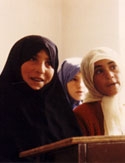Iran, 1975
Mitte der 60er Jahre wurden im Iran gewaltige Anstrengungen unternommen, um das Land zu einer modernen Industrienation zu machen. Die Mittel zu dieser vom Schah lancierten „Weißen Revolution“ lieferte das Erdöl. Autobahnen, Fabriken, Häfen und Flugplätze wurden gebaut und die Armee wurde zur mächtigsten Streitmacht des Mittleren Ostens aufgerüstet.
Die Landreform, die zum Angelpunkt der Revolution werden sollte, war ein klarer Mißerfolg. Während die Großgrundbesitzer großzügig abgefunden wurden und so in die neu entstehende Industrie investieren konnten, sind die Bauern ohne Aussicht auf Ausbildung und Arbeit zur Landflucht gezwungen.
Der Iran muß immer mehr Nahrungsmittel einführen, die neuen Industrien finden keine Absatzmärkte, die Einfuhren verschlingen die Erdölgelder. Erklärtes Ziel der „Weißen Revolution“ des Schahs war auch, die iranische Bevölkerung kulturell zu „Europäern“ zu machen. Daß das zu einer Krise der kulturellen Identität führen würde, die eine islamische Revolution zur Folge haben wird, wird in dem Film vorausgesagt. Die Entwicklungspolitik des Schahs, der sich der westlichen Welt als einzig ernstzunehmender Wirtschaftpartner des Mittleren Osten präsentierte, wird aus der Sicht des Volkes dargestellt. Dadurch wurde der gängigen Berichterstattung über den Iran, geprägt vom Glanz seiner Monarchie, eine völlig andere Sichtweise gegenübergestellt.
Gordian Troeller und Marie-Claude Deffarge
Mitarbeit: François Partant
Kamera: Gordian Troeller
Ton: Ingrid Becker-Ross
Schnitt: Anna Koudelka
Länge: 43 Minuten
Erstausstrahlung: RB 07.07.1976
Film kaufen
Skript herunterladen[:en]Iran, 1975
In the mid 1960s, Iran made a tremendous effort to transform the country into a modern industrial nation. The Shah launched the „White Revolution“, funded by oil. Highways, factories, seaports and air terminals were constructed. The Persian army was rearmed in order to become the mightiest fighting force in the Middle East. However, land reform, which was supposed to be the pivotal point of the White Revolution, turned out to be a miserable failure. The big landowners were given generous compensation to enable them to invest in the new industries, whereas the peasants and small farmers were left out in the cold. With no work prospects, they migrated to the cities, in a rural exodus. Iran was forced to import food. The fledgling industries found no market for their products. The Petrodollars were being rapidly spent on imports. The Shah was also determined to make Europeans out of the Iranian population. That this would later lead to a crisis of cultural identity and bring about the Islamic Revolution is something that the film forecasts. The Shah presented himself and Iran as the only trading partner in the Middle East to be taken seriously by the West. In the film, his policies are reflected from the people’s point of view. The run-of-the-mill reporting on the Shah’s Persia was, at that time, all about its glamorous monarchy. Troeller/Deffarge’s film opens up a totally different perspective
Gordian Troeller and Marie-Claude Deffarge
in cooperation with François Partant
original title: Die weiße Revolution
camera: Gordian Troeller
sound: Ingrid Becker-Ross
editor: Anna Koudelka
colour
43 minutes
This film only exists in the German version.
Download the film
Download the script[:fr]Iran, 1985
La révolution islamique en Iran a marquée un refus très net des valeurs et de la civilisation occidentale. Le Shah rêvait pour son pays d’un développement sur le modèle occidental. Ses tentatives de réalisation ont provoquées une réaction de rejet de la part de tout un peuple qui s’est senti menacé dans son identité.
Les préceptes du Shiisme, avec sa revendication d’un état fondé sur les principes d’égalité et de justice devait constituer la base d’une nouvelle société. La vénération profonde pour les Martyrs apparaît aux enfants, dès le plus jeune âge, comme étant un idéal de la foi religieuse et fait que le martyre au nom de Dieu est devenu pour beaucoup quelque chose d’acceptable pour soi-même. Ce sont avant tout de jeunes gens qui font partie de la garde révolutionnaire et s’engagent pour l’abolition des classes dans un état de droit divin pour lequel ils sont prêts à mourir, eux-aussi.
L’éducation religieuse est de plus en plus assurée par les écoles.
Dans les campagnes, la population se déclare certes fidèle à l’Islam mais ses éléments sociaux et révolutionnaires n’y sont pas enracinés. Ce sont en tout cas les enfants qui propagent dans les familles les nouveaux enseignements – les familles qui doivent redevenir des centres de vie fondé sur les valeurs religieuses er morales.
Titre original : Erziehung zum heiligen Krieg
Réalisation : Gordian Troeller
Collaboration : Ingrid Becker-Ross
Caméra : Gordian Troeller
Son : Saïd Nezami, Jürgen Kauffels
Montage : Ingeburg Forth
43 minutes
Couleur
Ce film n’est disponible que dans sa version allemande.
